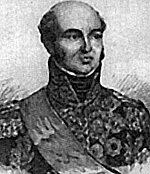Bernadotte 1806
Is There A Case For The Defence?
The Hero: Louis Nicolas Davout 1770-1823
by John Cook
| |
Davout was born at Annoux in the Yonne. His father was Jean François d'Avout, Squire and Lord of Raviéres and a lieutenant in the Régiment Royal de Chatres. In 1785 it was natural that he should enter the Ecole Militaire as a gentleman cadet. At the age of 18 he was sous-lieutenant in the cavalry regiment Royal-Champagne. He sided with the men of the regiment against the officers, who were largely unsympathetic to the Revolution and was imprisoned but released on 15 September 1791 when he resigned his commission. On 23 September he joined the 3rd Yonne battalion of volunteers and was elected to 2nd lieutenant colonel and in 1792 he was chef de bataillon, soon to become lieutenant colonel. He was also instrumental in forcing the defection of Dumouriez after his failure to overthrow the Jacobins, when Davout had his battalion fire on him. Davout always regretted that he had not been able to take Dumouriez prisoner. His part in the affair resulted in promotion to colonel on 1 May 1793 and appointment as provisional adjutant-general commanding a brigade comprising 3rd Yonne, 3rd Aube and 2/104 regiment. He had, however, expressed his dislike for Marat and the Jacobins and in July, his appointment as colonel adjutant-general having been confirmed, was transferred to the Vendée in the Armée des Côtes de la Rochelle. He served as a general de Brigade and was transferred back to the Armée du Nord in August 1793 on promotion to general de Division. The nightmare situation for senior officers in the revolutionary armies persuaded Davout to refuse higher command and he retired to his home but, despite having given ample proof of his loyalty, his dislike of the regime nothwithstanding, he was arrested and imprisoned. His action in the Dumouriez affair probably saved him and by October 1794 he was back as general de Brigade in the Armée de la Moselle. He was taken prisoner at the fall of Mannheim on 21 November 1795 but released on parole and he returned home, where he remained until the end of the campaign. Davout returned to the Armée du Rhin and campaigned with it in 1799. Davout had served with distinction and had proved to a capable commander and a stern disciplinarian whilst, at the same time, having great concern for the welfare of his men, a trait that was to continue to be his reputation under the Empire. He accompanied Bonaparte to Egypt with the Armée de l'Orient where he commanded a cavalry brigade and opposed, though he signed, the convention by which the French evacuated Egypt. In the absence of Bonaparte, who had returned to France, and in an attempt to reconcile Davout, Kléber made him commander of the cavalry and offered Davout promotion to general of division, which he refused. Davout left Egypt on 3 March 1800, but did not arrived in Toulon until 6 May, having been detained en route by the Royal Navy. On 3 July 1800 he was promoted General of Division in which capacity he command the light cavalry in the Army of Italy. In 1801 he was appointed Inspector General of the Cavalry and Commandant of the Grenadiers of the Consular Guard. Created Marshal of France and Colonel General of the Imperial Guard 19 May 1804 he commanded III Corps during the campaigns of 1805, 1806, 1807 and 1809. He was created Duke of Auerstädt 28 March 1808 and Prince d'Eckmühl on 15 August 1809. He commanded I Corps in 1812 and held Hambourg against an allied army in 1813/1814 until Napoleon's abdication. He surrendered the city on 27 May 1814. He was appointed Minister of War on 20 March 1815 and was responsible for signing the capitulation of Saint-Cloud on 5 July 1815, which brought the Napoleonic period to an end, and withdrew with his army to the Loire where he surrendered it to the Bourbon monarchy on 14 July 1815. He gave evidence for the defence at Ney's trial and was exiled to Louviers on 27 December 1815, were he lived in poverty until, unexpectedly, Louis XVII restored his rank and privileges in August 1817, naming him Peer of France on 5 March 1819. Davout died of tuberculosis in Paris on 1 June 1823. More Bernadotte and 1806
Bernadotte and 1806: Prosecution's Case Bernadotte and 1806: Defense's Evidence Bernadotte and 1806: Defense's Case Bernadotte and 1806: The Villain: Bernadotte Bernadotte and 1806: The Hero: Davout Bernadotte and 1806: Plan A and B Maps (very slow: 288K) A Footnote To Bernadotte: Scapegoat for Intelligence Failure? Back to Table of Contents -- First Empire #48 Back to First Empire List of Issues Back to MagWeb Master Magazine List © Copyright 1999 by First Empire. This article appears in MagWeb (Magazine Web) on the Internet World Wide Web. Other military history articles and gaming articles are available at http://www.magweb.com |

